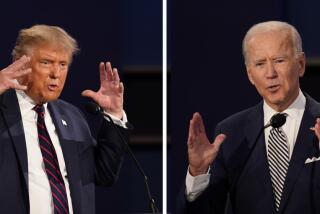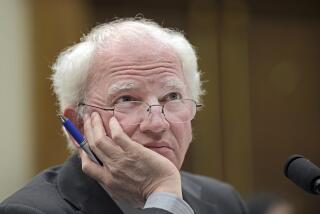Editorial: Trump’s latest Interior Department pick is bursting with conflicts of interest and alternative facts
So many of President Trump’s Cabinet appointments have been so alarming that nominations to posts further down in the pecking order might seem a bit anticlimactic. What’s the use of getting worked up over subordinate positions? There has got to be a point at which consternation over the president’s choices yields to exhaustion.
And then comes a nominee like David Bernhardt, Trump’s pick for deputy secretary of the Interior.
Bernhardt is a bad choice, a fact that should have become abundantly clear during last week’s Senate committee hearings. An attorney for partisans in California’s water battles, he comes laden with conflicts of interest.
Bernhardt repeatedly sued the Department of the Interior on behalf of the Westlands Water District, the politically powerful San Joaquin Valley irrigation agency that has fought federal protections for California salmon and other endangered species. He also had a major role in drafting legislation to undermine those protections. His firm is a top lobbyist for Cadiz Inc., which wants to pump Mojave Desert groundwater and send it by aqueduct to Southern California cities.
If Bernhardt is to be recused from decision-making on the very programs in which he has the most expertise, why appoint him to the post in the first place?
If he is confirmed, he will be in a position to align the department behind the interests of his former clients — or to recuse himself in accordance with Trump administration ethics guidelines. But if Bernhardt is to be recused from decision-making on the very programs in which he has the most expertise, why appoint him to the post in the first place?
Bernhardt wrote in a letter to the department that if confirmed, he would recuse himself himself for one year from matters related to former clients — “unless I am first authorized to participate.” The problem is, we may never know when that happens.
Like his predecessors, Trump may grant waivers that allow former lobbyists and industry officials to oversee implementation of regulations that they once lobbied for or against. Trump may be the first president, however, to try to prevent public disclosure of such waivers.
Thankfully, the Office of Government Ethics has, so far, rejected Trump’s request that it stop asking for copies of all waivers. But Bernhardt’s conflicts and the administration’s quest to keep waivers under wraps make a toxic combination.
Add to that the crucial role that scientific expertise plays in management of the Sacramento-San Joaquin River Delta, where biologists’ opinions about the volume of water needed to sustain endangered fish help determine how the state and federal government divvy up water among competing interests. It is bad enough that Bernhardt helped draft legislation that could potentially weaken the clout of those opinions. During his confirmation hearings, Bernhardt hinted that, regardless of the scientific findings, he would follow the “particular perspective” of the Trump administration.
Adherence to alternative-fact scenarios is the last thing we need in an agency mandated to make policy decisions based on scientific evidence. Bernhardt is the wrong choice for the job, and the Senate should reject his nomination.
Follow the Opinion section on Twitter @latimesopinion and Facebook
More to Read
A cure for the common opinion
Get thought-provoking perspectives with our weekly newsletter.
You may occasionally receive promotional content from the Los Angeles Times.






